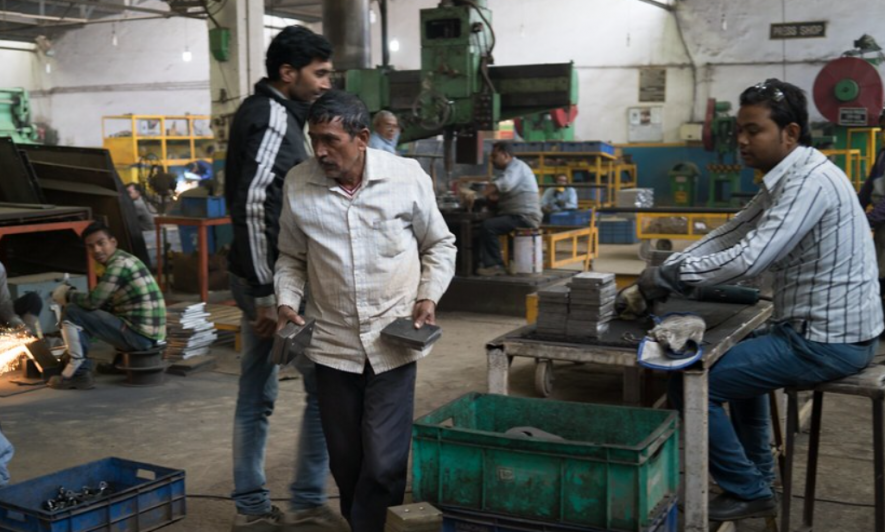Minimum Wage in Delhi: A Closer Look Beyond Headlines

Representational use only.Image Courtesy: Flickr
New Delhi: On October 19, the Delhi government announced a hike in minimum wages for workers in Delhi. The hike will be applicable to all three categories of workers -- skilled, semi-skilled and unskilled from October 1, 2023. With this announcement, Delhi has become the highest minimum wage-providing state in the country, said Chief Minister Arvind Kejriwal.
However, the decision has not enthused several labour experts, trade union leaders and workers. They believe that a closer look at the enforcement of the law concerned on the ground reveals a less rosy picture.In 2022, a study done by the Working People’s Coalition revealed a stark picture of the implementation of the minimum wage policy on the ground. According to the study, a staggering 95% of Delhi’s workforce doesn’t receive the minimum wage mandated by the government.
In an interview with NewsClick, a 21-year-old carpenter, Rahul, said the wage gets decided by the amount of work available in the market. The labour market is still grappling with job losses that occurred during the pandemic-induced lockdown of 2020. When questioned about his minimum wage earnings, Rahul pointed out the lack of a consistent formula in the market for determining minimum wages.
“The wage depends on the work, actually. If we have enough work, it goes up to Rs 800 per day, but if work is not adequate, sometimes we only get Rs 300 per day,” he said.
According to the new minimum wage policy, the monthly wages of skilled workers have increased from Rs. 20,903 to Rs. 21,215, up by Rs 312. Similarly, the wages for semi-skilled and unskilled workers have increased to Rs 19,279 and Rs 17,494, respectively.
Siddheshwar Shukla, vice president of the Centre of Indian Trade Unions (CITU), doesn’t mince words when he pins the failure to enforce minimum wage regulations on a lack of will within the labour departments of the Delhi government, particularly at the district level.
“There is a serious need for major reforms in the way the labour departments operate. Simply raising the minimum wage wouldn’t make any difference to workers as the enforcement of the law on the ground is almost non-existent,” Shukla told NewsClick.
He claimed that the government, too, was aware of its shortcomings in enforcing the law on the ground. However, the lack of commitment, along with the vested interest of bureaucrats, doesn’t let it take the required action in order to solve the issue of minimum wage.
Two years ago, on May 13, 2022, a fire in an industrial factory located in Delhi’s hustling location, Mundka, took the lives of 27 workers, out of which 21 were women. A fact-finding committee of the Working People’s Coalition later found out that nearly 90% of the workers were women. The workers used to be paid Rs. 5,000-7,000/month based on their roles, which was way lower than the minimum standard wage, which was Rs.15,400 at that time.
Ramendra Kumar, a member of the Working People’s Coalition, claimed that widespread corruption in the labour departments leads to such negligence in law enforcement.
“The corruption that arises from vested interests and the close proximity of some labour officials with employers is the major reason for workers not getting the wages they should get as per the law,” he said.
However, other major factors, such as the high unemployment rate along with the complex judicial process in order to pursue cases against employers who fail to meet the minimum wage standards, play a vital role in the implementation of the law. Though Delhi has the highest minimum wage policy, there is a genuine concern about employers moving to neighbouring states such as Haryana and Uttar Pradesh, where the minimum wage is significantly lower than in Delhi.
The minimum wage for skilled workers is Rs.7,085, whereas for semi-skilled and unskilled workers, it is Rs. 6,325 and Rs. 5,750 in Uttar Pradesh. In neighbouring Haryana, the wage for skilled, semi-skilled and unskilled workers is Rs. 13,442, Rs.11,612.4 and Rs.10,532.84, respectively.
Thaneshwar Adigaur, a member of the Labour Advisory Committee of the Delhi government, asserts that Delhi was suffering from a shortage of labour officials. This scarcity has given rise to a long list of issues, spanning from the failure to enforce minimum wage regulations to gender-based disparities in both pay and working conditions.
Furthermore, Adigaur underscores that the lack of action taken in response to workers' registered complaints also serves as a discouragement for those who seek to challenge their employers within the judicial framework.
Rakesh Sharma, a social worker who assists workers in the legal process, emphasises strengthening the labour bodies to solve the issue of minimum wage. The reforms, such as consistent surveys of the workplaces, industrial areas and workers, need to be the focus of all labour-related activities. The judiciary also plays an important role in determining the workers’ motivation if they go against the employer in the court. According to Sharma, the judiciary has also let down the workers when it comes to implementation of minimum wages.
“If the cases of minimum wages take a long time to give justice to the workers. Let’s face it: if a worker keeps everything aside and decides to fight the case against his employer, he is at risk of losing not only his employment but also the security of his life. In such a scenario, a timely judgement becomes vital, but such prompt resolutions are rare in our country,” he added.
However, his claim was contradicted by an official of the labour department of Delhi who spoke with NewsClick on the condition of anonymity. The official denied that judgements in such cases take a long time.
“It’s completely untrue to say that labour-related judgements take years. From my own experience, the judgement usually doesn’t exceed a year, in some cases sometimes six months,” he claimed.
Sharma, however, vehemently rejected the assertions made by the labour official. Additionally, he argued that the Delhi government's labour department should release the number of instances of minimum wages that were settled over the past two years in order to counter expert arguments.
In recent years, high inflation has affected the working-class communities the most around the country. While announcing the decision, the Delhi government’s statement attributed the Kejriwal government’s sincerity on the part of working-class communities who are grappling with the challenge of inflation. But, the real test lies in implementation on the ground.
Get the latest reports & analysis with people's perspective on Protests, movements & deep analytical videos, discussions of the current affairs in your Telegram app. Subscribe to NewsClick's Telegram channel & get Real-Time updates on stories, as they get published on our website.
























